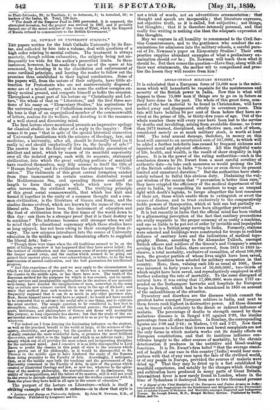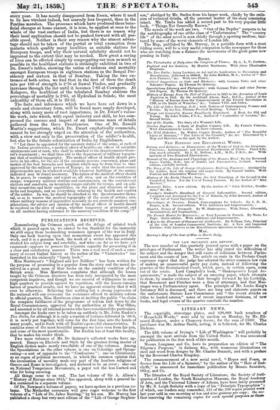ANGLO-INDIAN MILITARY HYGIENE. *
IT is calculated that a European force of 75,000 men is the mini- mum which will henceforth be requisite for the maintenance and security of the British power in India. Now this is what will happen to these 75,000 men if things are to go on in future as they have done in the past. The whole of this great foroe, com- posed of the best material to be found in Christendom, will have melted away and disappeared utterly in seventeen years. This
fate will have befallen 94 per cent of them before they have ar- rived at the prime of life, or thirty-five years of age. Out of the whole number there will every year have been lost to the service by deaths and invaliding, arising from avoidable disease, no fewer than 3473 trained, disciplined, and.effective men, each of whom, considered merely as so much military stock, is worth at least 1001. The total annual damage, therefore, in money on this head will amount to an ascertained sum of 347,0004, to-which will be added a further indefinite loss caused by frequent sickness and impaired moral and physical efficiency. All this frightful waste of life, health, and wealth, is the result of sheer stupidity in high places. It is in the power of the ruling authorities—such is the conclusion drawn by Dr. Ewart from a most careful scrutiny of authentic data—to take such measures as would prolong the life of the British soldier in India " to twice or even thrice its present limited and unnatural duration." But the authorities have obsti- nately refused to fulful this obvious duty. Disdaining the vul- gar wisdom of the maxim that " prevention is better than cure," they have crippled the efficiency of the medical department of the army in India, by compelling its members to wage an unequal fight with death's legions, to forego altogether the best resources of their art, those which enable them to extinguish or avert the causes of disease, and to trust exclusively to the comparatively feeble powers of therapeutics, which at best can but partially re- pair the mischief that might have been altogether prevented. It is but recently in India that the official mind has been visited by a glimmering perception of the fact that sanitary precautions are really requisite to the proper economy of so costly a machine, and one so liable to be put out of order by invisible and impalpable agencies as is a British army serving in India. Formerly, stations were selected and buildings were constructed for troops in reckless defiance of sanitary laws and the indications of medical topo. graphy. Hence, according to Sir Alexander Tulloch, amongst British officers and soldiers of the Queen's and Company's armies serving in the East Indies, there occurred, from 1815 to 1855 in- clusive, a total mortality, exclusive of casualties, of about 100,000 men, the greater portion of whose lives might have been saved, had better localities been selected for military occupation in that country. Here, then, valuing each life as usual at 1001., there was incurred in forty years a loss of 10,000,0001., two4hirds of which might have been saved, and reproductively employed in still further reducing the rate of mortality. To the same disregard of natural laws it was owing that 17,000,0001. were since 1757 ex- pended on the Berhampore barracks and hospitals for European troops in Bengal, which had to be abandoned in 1835 on account of the unhealthiness of the situation.
Dysentery and diarrhoea are the diseases which commit the greatest havoc amongst European soldiers in India, and next to them fevers rank highest in destructive power. All these diseases can be traced with certainty to the direct or indirect influence of malaria. The percentage of deaths to strength caused by these malarious diseases is in Bengal 4.01 against 2.93, the similar percentage from all other malsAies. In Bombay, the corresponding figures are 3.08 and 2.44; in Madras, 1.61 and 2.27. Now there is great reason to believe that fevers and bowel complaints are not the only forms in which malaria works out its deadly effects on European constitutions, and that its insidious influence con- tributes largely to the other sources of mortality, by the chronic deterioration it produces in the nutritive and blood-making functions. It is Dr. Ewart's firm belief " that the average stand- ard of health of our race in this country [India] would bear com- parison with that of any race upon the face of the civilized world, or of any ioeople in Europe, provided the sources of malaria were dried up." That they may be dried up is a fact established by manifold experience, and notably by the changes which drainage and cultivation have produced in many parts of Great Britain. Intermittent fever is now rarely found in London, where in the time of Sydenham it destroyed from one to two thousand persons • A Digest of the Vital Statistics of the European and Native Armies in Inaba; interspersed with Suggestions for the Eradication and Mitigation of the Preventible and Avoidable Causes of Sickness and Mortality amongst Imported and Indigenous Troops. By Joseph Ewart, M.D., Bengal Media.: Service. Published by Smith, Elder, and Co. every year. It has nearly disappeared from Essex, where it used to be less virulent indeed but scarcely less frequent, than in the Pontine marshes. The processes which have produced these bene- ficial changes at home cannot, it is true, be applied at once to the whole of the vast surface of India, but there is no reason why their local application should not be pushed forward with all pos- sible speed. Neither is their any reason why the utmost advan- tage should not be taken of the partial or total exemption from malaria which qualify many localities as suitable stations for European troops, and why their natural salubrity should not be improved to the extent that may be needed. How great a saving of lives can be effected simply by congregating our men as much as possible in the healthiest stations is strikingly exhibited in two of Dr. Ewart's tables, showing the ratios of sickness and mortality amongst European troops in eighteen stations in the Bengal Pre- sidency and sixteen in that of Bombay. Taking the two ex- tremes of both series, we find that in the first of them the death rate per 100 of strength is 2.76 at Itawnl Pindee, and gradually increases through the list until it becomes 7.82 at Cawnpore. At Kolapore, the healthiest of the tabulated Bombay stations the percentage of mortality is 2.05, at Hydrabad in Scinde, the most unhealthy of them all, it is 23.52. The facts and inferences which we have here set down in a crude and elementary form, will be found more amply develo along with many more of vast importance, in Dr. Ewart's v ua- ble work, into which, with equal industry and skill, he has com- pressed the essence and import of an immense mass of details gathered from the three Presidencies. One of Mr. Remold Martin's suggestions, which Dr. Ewart emphatically commends, cannot be too strongly urged on the attention of the authorities, with a view not only to the preservation of the soldier's health, but also to the future colonization of India by Englishmen. " ' Let there be appointed for the sanatory duties of the army, at each of the Indian presidencies, a medical officer of health—an officer of scientific attainments and of rank, who shall be attached to the Quartermaster-Gene- ral's department ; we shall thus add to the department of military, topogra- pay that of medical topography. The medical officer of health should pre- serve in his office, for the use of the scientific persons concerned, plans and models of the best barracks and hospitals which may be from time to time approved by the military powers of Europe, in order that the most recent impprovements may be rendered available wherever buildings of the nature indicated may be found necessary. The duties of the medical officer should be, in peace, to examine and report on all sites, and on the condition of camps, temporary military stations and cantonments, on the convalescent stations and sanatoria, on mountain ranges suitable for troops, and on soli- tary mountains and their capabilities, on the plans and structure of bar- racks and hospitals, and on everything relating to the health and comfort of the soldier. In war, he should be attached to the Quartermaster-Gene- ral, so as to master the medical topography of the scene of action ; and, where military reasons of imperative necessity do not overrule sanatory con- siderations, the advice and opinion of the medical officer of health should be received on the sites of camps, whether temporary or permanent, and on all matters having reference to the sanatory condition of the camp.' "



























 Previous page
Previous page